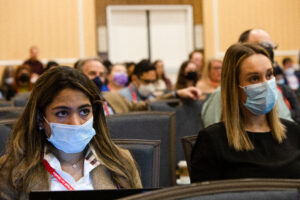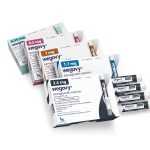
Conferences can be hectic to cover, and it’s difficult sometimes to pin down the researcher or presenter you need, much less get quotes from other attendees about a particular presentation. It can be even more challenging when you’re covering a conference virtually. In either case, preparation is key, and one of the most important ways to prepare is knowing the kinds of questions you’ll be asking presenters and outside experts.
Having a list of ready questions, whether they’re for the presenting researcher or an outside expert or attendee commenting on the research, can help you get the answers you need quickly in those precious moments at the end of a presentation or whatever brief time you have to pull the commenter away. A ready list is also helpful for those times when your brain has simply begun reaching conference carrying capacity, and it’s hard to think straight.
If you’re covering a conference virtually, you might have an easier time with researcher quotes if you’re conducting interviews over email. But if you do manage to catch a presenter on the phone, they likely won’t have much time, so being ready with your questions can ensure an efficient interview.
Below is a collection of questions you can use for nearly any medical study presentation at a conference. There are likely other questions you’ll want to ask that are specific to the study itself, but if you can’t think of anything to ask, the questions below are phrased to at least provide a couple quotable comments for your story.
Whether you use these exact questions, tweak them or develop your own, keep in mind that most of the time, what you primarily need is the clinical significance of the findings. Or, if there is no immediate clinical significance, your readers will want to know what makes the findings important, surprising or otherwise notable. In short, why are you reporting on this study and not any of the 200 other ones at the conference?
If the presentation is not a new research abstract but is instead aimed at providing continuing medical education credits for attendees, it’s less likely that anything earth-shattering or new will be a part of it. In that case, you typically want to know the most important take-home clinical points that the presenter wants attendees to walk away with, or the key point an attendee you are interviewing got from the presentation.
If you are especially limited on time, note the asterisks on the most important questions.
Questions for presenting researchers
- Could you please state and spell your name, your title with degrees, your institutional affiliation and your city?*
- Do you have any financial disclosures or conflicts of interest? (In phone conversations, I ask this question at the end, but with the limited time available at a conference, where you might get cut off early, it’s worth asking right at the start.)*
- To what extent were your findings surprising, or not surprising, and why?*
- Why is this research or your findings important?
- What is the key clinical take-home message from your study for clinicians? What does this mean for their everyday clinical practice?*
- Is there anything you want to add or particularly point out to others, or is there anything I should have asked you about that I didn’t?*
Additional questions that apply to many, but not all, studies:
- To what extent are your findings generalizable to the general population (or to the U.S. or to the world if the findings are country-specific)?
- What role, if any, do social determinants of health play in your findings?
- Do your findings suggest the need for any particular changes in policy?
Finding commenters unrelated to the study
It’s important to include quotes from study presenters and researchers, but it’s also important to get the perspective of others not related to the study. Ideally, these are clinicians or fellow researchers attending the presentation, which often means needing to approach folks in those few seconds after the presentation before people have left the room or the next presentation has started. Here are a couple tips for identifying those most likely to comment:
- If the room has microphones set up for questions, sit near a microphone so you can see the attendees who ask questions or offer comments during the presentation. They usually introduce themselves, but if they don’t, you may be able to see their name tag and use what they say during the Q&A.
- If their comments or questions aren’t quote-worthy, you at least know who they are and can look for them after the presentation. These folks are often more willing to talk to a reporter since they’ve already spoken during the presentation.
- Look for small groups of two or three people talking who seem approachable. Stand politely near them until they acknowledge you so that you can introduce yourself and ask if they can comment. This lets you try for multiple people at once, and sometimes peer pressure works in your favor, with one of them pushing another to comment. You may also get multiple comments from a back-and-forth between them.
- Look for an older clinician who has several younger attendees with them. Often this is a senior researcher with medical students or fellows, which means the researcher is likely their instructor and already in “teacher mode.” They’re sometimes more willing to talk because they can model for their students how to interact with the press.
- If you keep striking out, talk to the moderators. They had no choice but to listen to each presentation and may feel more comfortable talking to a journalist. They’re also easier to find — in person, via email, or with the press office’s help — even after everyone has left if you never found someone.
- If all else fails and no one will talk to you, reach out to the press office and ask them to help you find someone who can comment on the research.
- If you’re covering the conference virtually, look at those who comment in the comment box of the platform if there’s a publicly visible one. If not, reach out to press officers at university medical schools who can help identify someone to comment on the research.
Questions for outside experts/attendees
Once you’ve found someone unrelated to the research who can comment on it, here are some questions to pick from. There’s rarely time to ask all of these questions, but choosing a few of these will generally get you what you need, especially those with asterisks:
- Could you please state and spell your name, your title with degrees, your institutional affiliation and your city?*
- Do you have any financial disclosures or conflicts of interest?*
- What did you think of the presentation and/or research in general?
- What was most valuable to you about this presentation?
- To what extent were any of the findings surprising (or not) and why?*
- What do you think is the most important take-home message from this research or presentation for clinicians in their everyday practice?*
- Is there anything here you had questions, concerns or skepticism about?
- How will the information in this presentation be useful or relevant to you in your practice or work?*
- What limitations or caveats are important to consider in this study, especially if there are any that the researchers did not mention or glossed over?*
- Are there any red flags or particularly troublesome aspects of the findings that are worth mentioning?
- Is there anything else you want to add?









